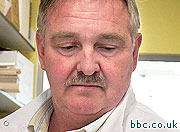The BBC allowed an academic to appeal for funds for a hangover-free alcohol drug on its flagship radio programme, a think-tank has said.
Professor David Nutt appeared on BBC Radio 4’s Today programme on Monday where he called on the Government to back his idea.
However Claire Fox, Director of the Institute of Ideas, said the broadcast was “a kind of lobbying which got disguised as a science item”.
Invest
She described Prof Nutt’s comments as “outrageous” and said: “Nobody else would get away with it would they?”
She added: “If someone else went on and just said: ‘I am here to get investment in my company’ the BBC wouldn’t let that”.
Prof Nutt was sacked as a Government drugs advisor in 2009 after the then Home Secretary said he was “campaigning against” Government decisions.
Addictive
His new idea would involve using certain compounds that give the sensation of alcohol, and also one which can reverse the effects – meaning users could become sober straight away.
Prof Nutt is seeking investors for the idea, but it has been criticised by an alcohol awareness charity.
Alcohol Concern said: “We think we should focus on getting to the heart of the problem about what is going wrong in our drinking culture rather than swapping potentially one addictive substance for another.”
Funding
And it said the Government should “invest in policies that we know work to counter the problems of alcohol like minimum unit pricing and advertising restrictions”.
A BBC spokesman said: “Professor David Nutt was interviewed about a drug which he claimed could mimic the sensation of alcohol without the health risks”.
The spokesman added: “He was questioned about the potential complications involved and it was made clear to listeners that his research was at the early stages because he had not yet obtained funding for the project.”
Experiment
In 2009 Prof Nutt was sacked after he made comments criticising the Government’s reclassification of cannabis to class B, from class C.
The then Prime Minister Gordon Brown said: “We cannot send out a message to young people that it’s OK to experiment with drugs and to move on to hard drugs.”

